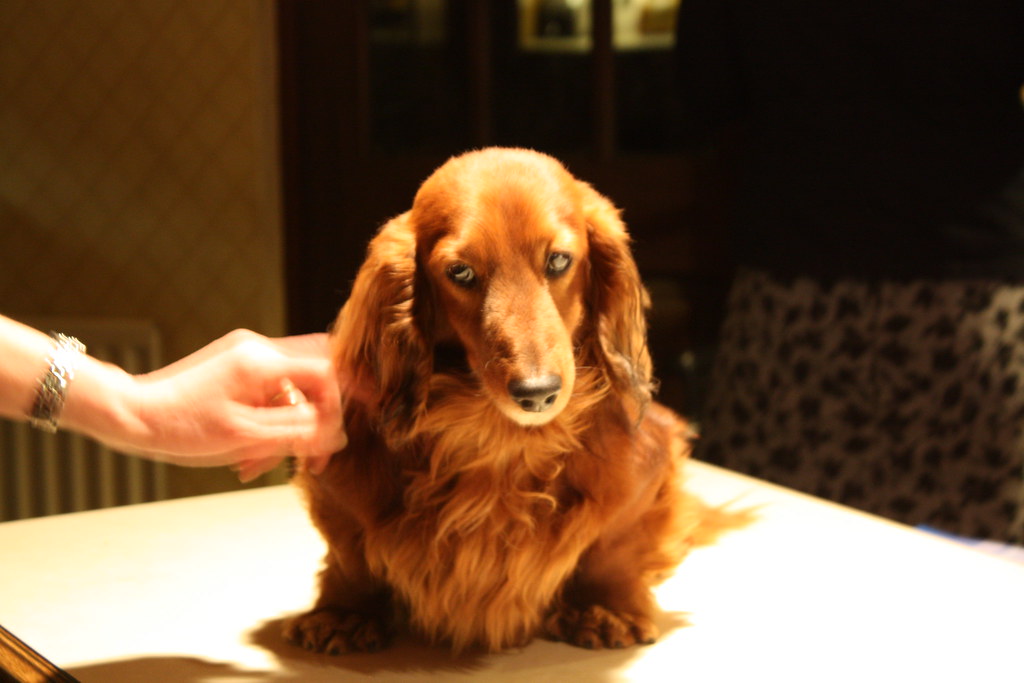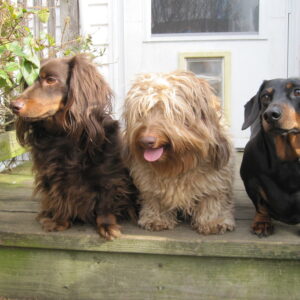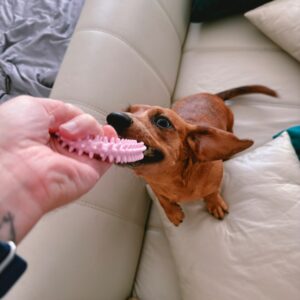Jealous dachshund behavior can be a perplexing issue for many dog owners. Understanding the emotional dynamics in these adorable, long-bodied dogs is crucial for maintaining a harmonious household. Dachshunds, known for their loyal and affectionate nature, can sometimes exhibit signs of jealousy when they feel their position as a beloved companion is threatened. In this article, we will delve into various aspects of jealousy in dachshunds, providing insights into understanding the root causes, recognizing common signs, and exploring effective strategies to address these behaviors. By creating a more balanced environment and utilizing training tips, you can help your dachshund feel secure and loved, ultimately enhancing your relationship with your furry friend.
Understanding Jealousy in Dachshunds
Jealousy is a common emotion that can affect dogs, including Dachshunds. These small, energetic dogs are known for their strong personalities and can sometimes display jealousy when they feel their position in the family is threatened. Understanding the roots of this behavior is essential for fostering a healthy environment for your pet.
Jealousy in Dachshunds often stems from their desire for attention and affection. They may become protective of their owners and can react negatively when they perceive competition from other pets or even people. This behavior can manifest in various ways, and recognizing the signs early can help you manage it effectively.
Several factors contribute to jealousy in Dachshunds:
- Personality: Dachshunds are known for their strong-willed nature, making them more prone to jealousy.
- Attachment: These dogs tend to form strong bonds with their owners, leading to possessiveness.
- Changes in Environment: New pets, babies, or significant changes in the household can trigger jealous behavior.
Understanding these factors can help you address jealousy in your Dachshund. By recognizing their emotional needs and providing consistent attention, you can create a more harmonious living situation for both your dog and your family.
Common Signs of Jealous Dachshund Behavior
Recognizing jealous behavior in your Dachshund is crucial for maintaining a happy home. Here are some common signs to look for:
- Excessive Barking: If your Dachshund barks more than usual when you give attention to others, it may be a sign of jealousy.
- Attention-Seeking: Your dog might try to push their way between you and another person or pet, demanding your attention.
- Resource Guarding: Watch for signs of your Dachshund guarding toys, food, or even your lap from others.
- Unusual Aggression: Some Dachshunds may show aggression towards other pets or people when they feel threatened by competition for your affection.
- Withdrawal: If your dog becomes quiet or withdrawn when you interact with others, it could indicate feelings of jealousy.
- Destructive Behavior: Chewing or destroying items when they feel left out can be a sign of jealousy.
- Physical Clinginess: Your Dachshund may become overly clingy, wanting to be on your lap or by your side constantly.
Being aware of these signs can help you address your Dachshund’s feelings and create a more balanced environment for them.
How Jealousy Affects Your Dachshund’s Mood
Jealousy can significantly influence your dachshund’s emotional well-being. When a dachshund feels jealous, it may lead to various mood changes that can affect its behavior and overall happiness.
Understanding the Mood Shift
When your dachshund experiences jealousy, you might notice a sudden shift in its mood. This can manifest in different ways, such as:
- Increased anxiety: A jealous dachshund may become more anxious, especially when competing for your attention.
- Withdrawal: Some dogs may withdraw from social interactions, preferring to stay alone rather than engage with others.
- Aggression: In some cases, jealousy can lead to aggressive behavior towards other pets or even people.
The Connection Between Jealousy and Mood
Jealousy often stems from a lack of attention or perceived competition for your affection. This feeling can create stress for your dachshund, leading to:
- Changes in appetite: A jealous dog may eat less or become overly hungry as it seeks comfort.
- Destructive behavior: To cope with jealousy, some dachshunds may chew on furniture or toys.
- Excessive barking: This is a common way for a jealous dachshund to express its feelings and seek attention.
Long-Term Effects on Mood
If jealousy is not addressed, it can lead to chronic stress, which may have long-term effects on your dachshund’s mood. This can result in:
- Depression: A consistently jealous dog may show signs of depression, such as lethargy and disinterest in activities.
- Social issues: Jealousy can hinder your dachshund’s ability to socialize with other dogs, leading to isolation.
In conclusion, recognizing how jealousy affects your dachshund’s mood is crucial. By understanding these changes, you can take steps to help your furry friend feel more secure and loved.
Ways to Address Jealous Behavior in Dachshunds
Addressing jealous behavior in Dachshunds requires a thoughtful approach. Here are some effective strategies to help manage and reduce jealousy:
- Establish a Routine: Create a consistent daily schedule for feeding, walks, and playtime. This helps your Dachshund feel secure and reduces anxiety.
- Provide Individual Attention: Spend quality time with your Dachshund alone, ensuring they feel valued and loved. This can help alleviate feelings of jealousy.
- Positive Reinforcement: Reward your Dachshund for calm behavior when around other pets or people. Use treats and praise to reinforce good behavior.
- Encourage Independence: Teach your Dachshund to enjoy time alone. Use toys or puzzles to keep them occupied while you attend to other tasks.
- Limit Competition: If you have multiple pets, create designated spaces for each one to reduce competition for attention and resources.
- Socialize Gradually: Introduce your Dachshund to new pets or people slowly. Monitor their reactions and provide support to help them adjust.
- Redirect Negative Behavior: If your Dachshund shows signs of jealousy, redirect their attention to a toy or command them to perform a trick.
- Be Patient: Changing behavior takes time. Be consistent with your approach and give your Dachshund time to adjust to changes.
By implementing these strategies, you can help your Dachshund feel more secure and reduce their jealous behavior, leading to a happier and more balanced pet.
The Role of Attention in Dachshund Jealousy
Attention plays a crucial role in the behavior of Dachshunds, especially when it comes to feelings of jealousy. These dogs are known for their strong bonds with their owners, and any perceived lack of attention can trigger jealous behavior.
When a Dachshund feels that they are not receiving enough attention, they may exhibit signs of jealousy. This can manifest in various ways, including:
- Barking: Excessive barking can be a way for your Dachshund to demand attention.
- Whining: A whiny dog may be trying to express their discomfort with the situation.
- Clinginess: Your Dachshund may follow you around more than usual, seeking your attention.
- Aggression: In some cases, jealousy can lead to aggressive behavior towards other pets or even people.
Providing consistent attention is essential to reduce feelings of jealousy in your Dachshund. Here are some key points to consider:
- Quality Time: Spend dedicated time with your Dachshund daily. This can include playtime, walks, or simply relaxing together.
- Positive Reinforcement: Reward your Dachshund with treats and praise when they display good behavior, reinforcing their positive connection with you.
- Balance Attention: Ensure that all pets in the household receive equal attention to prevent jealousy among them.
By understanding the role of attention, you can help manage your Dachshund’s jealousy and create a more harmonious environment for everyone involved.

Training Tips to Manage Jealous Dachshund Behavior
Managing a jealous Dachshund requires patience and effective training techniques. Here are some training tips to help you address and reduce jealousy in your furry friend:
- Establish a Routine: Dogs thrive on consistency. Create a daily schedule for feeding, walks, and playtime to help your Dachshund feel secure.
- Positive Reinforcement: Use treats and praise to reward your Dachshund for calm behavior. This encourages them to associate good behavior with positive outcomes.
- Desensitization: Gradually expose your Dachshund to situations that trigger jealousy. Start with low-stress scenarios and slowly increase the challenge as they become more comfortable.
- Teach Commands: Basic commands like “sit,” “stay,” and “leave it” can help manage your Dachshund’s behavior during jealous moments. Practice these commands regularly.
- Provide Individual Attention: Spend quality time with your Dachshund alone to reinforce your bond. This can help reduce feelings of jealousy when other pets or family members are present.
- Redirect Attention: When you notice signs of jealousy, redirect your Dachshund’s focus to a toy or a game. This helps them learn to cope with their emotions in a positive way.
- Encourage Socialization: Organize playdates with other dogs to help your Dachshund learn to share attention and resources. This can lessen feelings of jealousy over time.
- Stay Calm: Your Dachshund can sense your emotions. Staying calm and composed during jealous moments can help them feel more secure.
By implementing these training tips, you can help your Dachshund manage their jealousy and create a more harmonious environment for everyone.
Socialization Strategies for Jealous Dachshunds
Socializing your jealous Dachshund is crucial for their well-being. Proper socialization helps them feel secure and reduces jealousy. Here are some effective strategies:
- Start Early: Begin socializing your Dachshund when they are a puppy. Introduce them to various people, pets, and environments.
- Controlled Introductions: When meeting new dogs, do it in a controlled setting. Use leashes and keep the atmosphere calm.
- Positive Reinforcement: Reward your Dachshund with treats and praise when they interact positively with others. This encourages good behavior.
- Gradual Exposure: Slowly expose your Dachshund to different situations. Start with less overwhelming environments and gradually increase the complexity.
- Play Dates: Arrange play dates with calm and friendly dogs. This can help your Dachshund learn to share attention and space.
- Group Classes: Consider enrolling your Dachshund in obedience or socialization classes. These provide structured environments for learning.
- Monitor Body Language: Always watch your Dachshund’s body language. If they show signs of stress or jealousy, give them a break.
- Consistency is Key: Be consistent with your socialization efforts. Regular interactions will help your Dachshund become more comfortable over time.
By implementing these socialization strategies, you can help your jealous Dachshund become more confident and less prone to jealousy. Remember, patience and consistency are essential in this process.
When to Seek Professional Help for Jealousy Issues
Recognizing when to seek professional help for your dachshund’s jealousy issues is crucial for their well-being and your peace of mind. Here are some key indicators that it may be time to consult a professional:
- Persistent Behavior: If your dachshund’s jealousy persists despite your efforts to address it, a professional can provide tailored strategies.
- Escalating Aggression: If your dog shows signs of aggression towards other pets or people when feeling jealous, it’s important to seek help.
- Severe Anxiety: If jealousy leads to extreme anxiety or stress in your dachshund, a professional can help manage these feelings.
- Impact on Daily Life: If your dog’s jealousy disrupts your daily routine or affects your family’s quality of life, it’s time to consult an expert.
- Lack of Improvement: If you notice no improvement after implementing training techniques, a professional can offer new insights and methods.
Seeking help from a veterinarian or a professional dog trainer can provide you with the resources and support needed to effectively manage your dachshund’s jealousy issues. Remember, addressing these behaviors early can lead to a happier and healthier pet.
The Impact of Jealousy on Dachshund Relationships
Jealousy can significantly influence the dynamics between dachshunds and their owners or other pets. Understanding this impact is crucial for fostering healthy relationships.
Effects on Social Interactions
When a dachshund feels jealous, it may exhibit aggressive behavior towards other pets or even family members. This can lead to:
- Increased tension in the household.
- Isolation of the jealous dachshund from other pets.
- Strained bonds with family members.
Emotional Well-being
Jealousy can also affect a dachshund’s emotional state. A jealous dog may experience:
- Heightened stress levels.
- Feelings of insecurity.
- Changes in overall mood.
Impact on Training and Behavior
Jealousy can complicate training sessions. A dachshund may:
- Become distracted during training.
- Show resistance to commands.
- Engage in disruptive behaviors.
Building Healthy Relationships
To mitigate the negative effects of jealousy, it’s vital to:
- Provide equal attention to all pets.
- Encourage positive interactions between pets.
- Establish a consistent routine for feeding and playtime.
By addressing jealousy proactively, owners can create a more harmonious environment for their dachshunds and strengthen their relationships with them.
Creating a Balanced Environment for Your Dachshund
Creating a balanced environment for your Dachshund is essential for their happiness and well-being. A harmonious space helps reduce stress and promotes positive behavior. Here are some key elements to consider:
1. Safe and Comfortable Space
Ensure your Dachshund has a designated area that is both safe and comfortable. This space should be free from hazards and provide a cozy spot for them to relax.
2. Consistent Routine
Establishing a consistent routine helps your Dachshund feel secure. Regular feeding, walking, and playtime create predictability in their day.
3. Social Interaction
Dachshunds thrive on social interaction. Engage with them regularly and encourage playtime with other dogs or family members. This helps build their confidence and reduces feelings of jealousy.
4. Mental Stimulation
Provide plenty of mental stimulation through toys, puzzles, and training exercises. Keeping their minds engaged can prevent boredom and destructive behavior.
5. Positive Reinforcement
Use positive reinforcement to encourage good behavior. Reward your Dachshund with treats or praise when they exhibit calm and balanced behavior.
6. Limit Stressors
- Identify and minimize potential stressors in your home.
- Keep noise levels low and avoid chaotic environments.
- Provide a quiet place for your Dachshund to retreat when needed.
7. Regular Exercise
Ensure your Dachshund gets enough physical exercise. Daily walks and playtime help release pent-up energy and improve their overall mood.
8. Healthy Diet
A balanced diet is crucial for your Dachshund’s health. Consult your veterinarian to choose the best food for their specific needs.
9. Establish Boundaries
Set clear boundaries within your home. This helps your Dachshund understand what is expected of them and reduces anxiety.
10. Monitor Changes
Be aware of any changes in your Dachshund’s behavior. If you notice signs of stress or jealousy, address them promptly to maintain a balanced environment.
By focusing on these elements, you can create a balanced environment that supports your Dachshund’s emotional and physical well-being.




